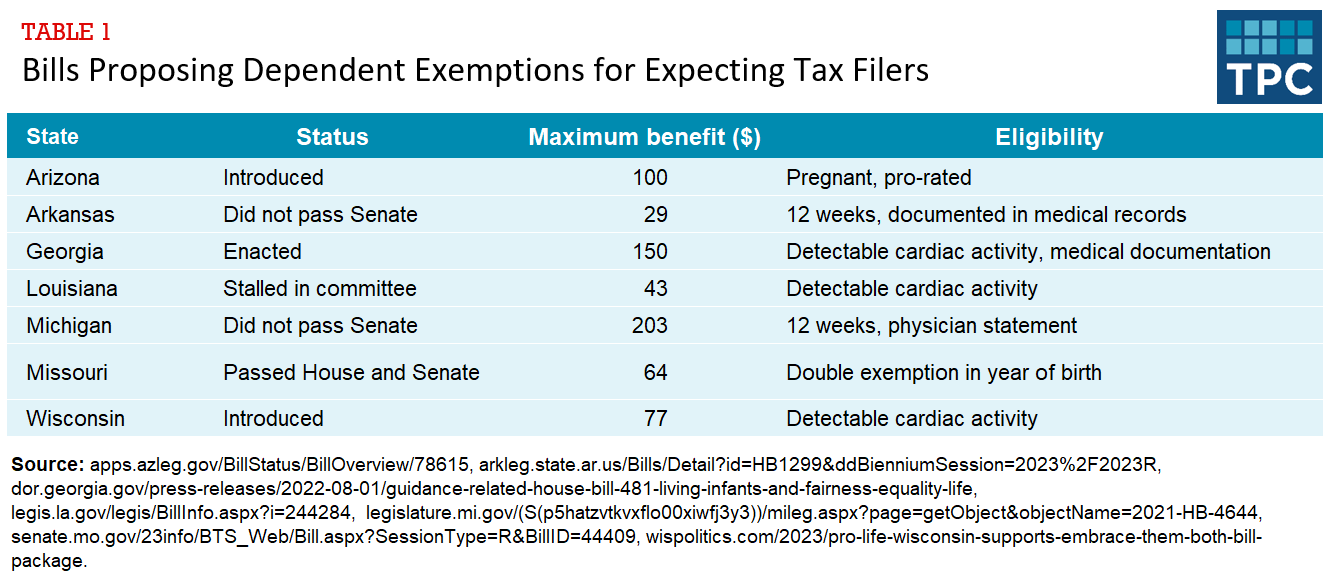State Tax Policy One Year After the Dobbs Ruling
About one year ago, the US Supreme Court struck down the constitutional right to abortion in Dobbs v. Jackson Women’s Health Organization. Since then, 13 states have effectively banned abortion and an additional 13 states have placed strong restrictions on who can get abortions. The post-Dobbs landscape has also prompted states with tighter abortion restrictions to reconsider their tax codes.
Since then, 12 state legislatures have considered tax proposals motivated by the Dobbs decision, and two states — Georgia and Mississippi — have implemented them. The most common proposals would add fetuses to the tax code’s definition of a “child” and make crisis pregnancy centers — non-profits established by anti-abortion groups that seek to dissuade women from having abortions — eligible for charitable tax deductions.
Dependent Exemptions for Expecting Tax Filers
Legislators in seven states and some members of Congress have introduced legislation that would allow tax filers to claim a fetus as a dependent. The Governor of Utah proposed this policy in his State of the State Address and Georgia introduced the policy earlier this year.
The amounts provided under these policies are small. Georgia provides a maximum of $150 in tax savings. And because it’s a deduction, and not a refundable tax credit, many low-income families cannot even get that benefit. Other states would not be much more generous; the largest proposed deduction, in Michigan, would provide a maximum of $203 (figure 1).
Beyond offering limited tax benefits, these deductions can be cumbersome to claim. As outlined by my colleague Richard Auxier, it’s not always easy to tell who is eligible to claim the fetus as a dependent. Medical documentation could be difficult to access, expensive, and difficult for tax authorities to evaluate. And these policies could be cruel to expecting parents: would miscarriages and stillbirths have to be reported to accountants and tax authorities?
Despite the small amounts available and difficulties to claim tax benefits, these policies could have significant consequences. As my colleague Renu Zaretsky noted last spring, these bills are designed to tell voters that the sponsors oppose abortion and to define life, and parenthood, on lawmakers’ terms. Georgia’s tax break, and proposed bills in Michigan and Wisconsin — define the fetus to be a person, setting up conflicts with the rights of pregnant people.
Deductions for Donations to Crisis Pregnancy Centers
Five states have also considered laws that would provide tax benefits to those who donate to crisis pregnancy centers. Additionally, Missouri has a pre-Dobbs tax credit for donations to crisis pregnancy centers in the state.
Crisis pregnancy centers, sometimes called pregnancy resource centers or maternal wellness centers, seek to dissuade or prevent people from terminating a pregnancy. They often use deceptive tactics, supply false information about abortion, and are poorly regulated; many do not have medical staff. Despite this, they are sometimes publicly funded.
The proposed tax credits could provide significant new funding to crisis pregnancy centers. Alabama (where a proposal passed in the House and has moved to the Senate) and Kansas (where a proposal was vetoed by the governor) would have each provided $10 million in new tax credits to donors, while Louisiana (where a proposal was sent to the governor and is expected to be signed into law) would provide up to $5 million. These credits could also give taxpayers far larger deductions than they might receive from donating to other charitable organizations.
We are likely to see additional types of tax legislation motivated by the Dobbs decision. Texas has considered prohibiting receipt of tax incentives by businesses who pay for employee’s abortions and West Virginia legislators have tied expanded adoption tax credits to crisis pregnancy center funding. As busy as legislators have been in the first year after the Dobbs ruling, tax proposals related to the abortion debate are likely to become even more common in the coming years.






